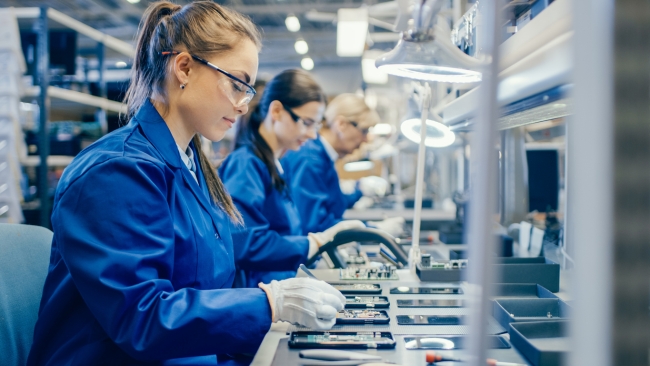5 minute read • published in partnership with Make UK
Insight: Driving success through workplace culture
The UK manufacturing sector is facing a skills shortage, and companies need to put workplace culture at the heart of their strategy to attract and retain top talent. Make UK explores how manufacturers can drive growth and be more resilient when enhancing their workplace culture.
In today’s cost-conscious climate—especially with the recent rise in National Insurance contributions—tight budgets mean manufacturers must rely on a motivated, connected workforce that finds purpose in both the job and the people around it.
For UK manufacturers, building a positive, innovative culture isn’t just good for morale—it’s a smart business move that boosts productivity, reduces staff turnover, and strengthens resilience.
The manufacturing industry is undergoing a rapid transformation driven by advancements in automation, artificial intelligence, supply chain disruptions, and a shifting workforce landscape. These changes require businesses to create a culture that is robust, resilient, and adaptable. How you engage your people can make all the difference. Prioritising culture now sets you up to thrive, no matter what comes next.

Picture: Getty/iStock
Why workplace culture matters
At its core, workplace culture is the shared values, beliefs, and behaviours that influence how employees interact with each other, approach their work, and contribute to the overall success of the organisation. A strong, positive culture leads to tangible business benefits. By getting the culture right, manufacturers will be better prepared for growth. This should be seen as a top three focus for futureproofing success alongside technology and investments.
• Attract and retain talent: For manufacturers in the UK, retaining skilled workers is more critical than ever due to an ageing workforce and skills shortages. According to Gallup, highly engaged teams show 21% greater profitability, and employees who are engaged are 59% less likely to look for a job with another company. According to a LinkedIn survey, 70% of professionals globally said that a company’s culture is more important than salary when deciding on a job, with the same study noting that companies with strong cultures have 4x the employee retention rate of those with weaker cultures.
• Enhanced productivity: Research from the Harvard Business Review shows that companies with a strong culture experience 30% higher levels of productivity. Similar findings were uncovered in a report from McKinsey & Company, which found that companies with positive organisational cultures are 12% more productive than those with less robust cultures. For UK manufacturers, this means better coordination and streamlined processes, reducing waste and increasing output.
• Adaptability in a changing industry: The manufacturing industry is undergoing rapid transformation, with advancements in technology, automation and shifting global trade patterns. A Deloitte report found that organisations with a learning-oriented culture are 92% more likely to innovate and 46% more likely to be first movers in their industry.
A process for culture change
Developing a robust culture takes time and effort and should be seen as a journey rather than a destination. If you’re looking to improve organisational culture, you should consider the following steps.
Gain top-level commitment: Any culture development is impossible without the support of senior leaders, so gaining their buy-in is vital.
Establish current position: Understanding where you are currently is critical, otherwise how do you know what to aim for? Getting an objective evaluation from all areas of the workforce will help ensure accuracy. Be that a survey, a workshop, alongside expert observation.
Agree goals: A successful workplace culture begins with a clear vision for the direction and values.
Upskill to influence: Make sure anyone with responsibility for driving cultural change has the knowledge and skills to support. For example, senior leaders play a key role in shaping an organisation’s culture, but do they know this and can they do something about it?
Action plan: Develop an action plan based on your goals, challenges and opportunities.
Monitor: As with other improvement programmes this will be a journey of change. After a period, it may be necessary to go back a few steps, revaluate your current position and adjust as necessary.

Picture: Getty/iStock
Culture development in action
At Make UK, we have helped numerous manufacturing businesses strengthen their workplace culture through targeted initiatives surrounding both human resources (HR), and health & safety. By providing expert consultancy support, we have enabled organisations to create environments where employees feel valued, engaged, and motivated to succeed.
Developing future leaders
We have supported businesses in preparing their next generation of leaders through leadership development programmes and executive coaching. Our tailored approach has helped future leaders step up with confidence while equipping existing leaders with the skills and knowledge needed to navigate today’s challenges.
Engaging employees through insight
Understanding employee sentiment is crucial for shaping a positive workplace culture. We have worked with businesses to implement employee surveys, including annual and pulse surveys, to benchmark current performance and ensure leadership teams stay connected to workforce needs enabling them to make informed decisions.
Strategic leadership visioning and influence
To help businesses set clear culture strategies, we have facilitated leadership visioning workshops and accredited training that bring senior teams together to define priorities and align HR and health & safety planning with wider business goals. These sessions have given organisations a structured approach to navigating the future.

Picture: Getty/iStock
Attracting and retaining talent
We have helped businesses win the battle for talent by providing strategic HR support to attract, retain, and develop top talent. Through tailored recruitment planning and people strategies, we have ensured organisations have the right people in the right roles at the right time.
By working closely with manufacturers across these areas, we have helped them build strong, resilient workplace cultures, where employees are motivated not just by pay but by their work and the people around them.
Case study: Development of a bespoke behavioural safety programme
BRUSH Group is a leading provider of agile and adaptive engineering solutions and products. While health and safety incidents are rare due to strict adherence to regulations, an insight survey indicated that there was a perception in some areas of the business that risks needed to be taken to get the job done. BRUSH recognised an opportunity to drive safety culture forward and approached Make UK to design and deliver a behavioural safety workshop. The bespoke programme, aimed at upskilling employees, incorporated content from senior leaders, engaging presentation and interactive activities to blend theory with practical examples and scenarios.
Beyond compliance, into culture
Manufacturers that embrace culture improvements will not only build a positive work environment but also position themselves for growth, adaptability and resilience.
Using a tried-and-tested four-step solution, Make UK combines strengths in consultancy and training to support organisations that want to understand and improve their safety culture. From objectively evaluating safety culture maturity to gauging and shaping c-suite support, Make UK health and safety experts can help.
Make UK’s HR experts specialise in leadership development and coaching to prepare future leaders to step up and give existing leaders the skills and knowledge they need to succeed.
For more information, please visit the Make UK website or can you call our team on 0808 168 5874 or email enquiries@makeuk.org.